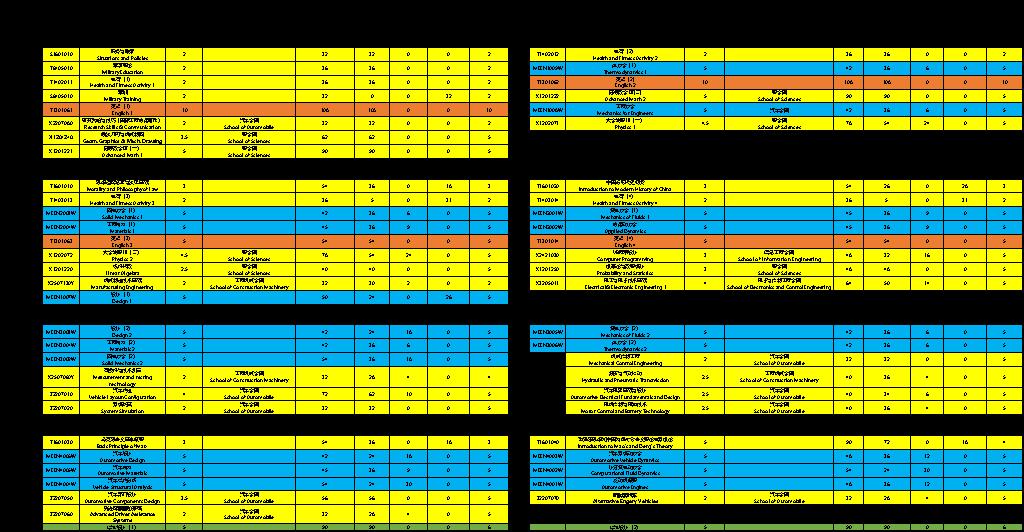Communication: graduates will be fluent in both Chinese and English. They can be able to communicate with international colleagues efficiently and have a good skill on presentation and public on engineering project.
Part Three: Core modules
Chang’an University: Geometry Graphic and Mechanical Drawing 1, Research Skills and Communication, Manufacturing Engineering 1, Vehicle Layout / Configuration, System Simulation, Mechanical Control Engineering, Motor Control and Battery Technology, Vehicle Components Design, Advanced Driver Assistance Systems, Alternative Energy Vehicles.
University College Dublin: Design 1, Design2, Mechanics for Engineers 1,Thermodynamics 1, Thermodynamics 2, Materials 1, Materials 2, Applied Dynamics, Solid Mechanics 1, Solid Mechanics 2, Mechanics of Fluids 1, Mechanics of Fluids 2, Automotive Design,Automotive Vehicle Dynamics, Automotive Materials, Vehicle Structural Analysis, Computational Fluid Dynamics, Automotive Engines.
Textbooks &teaching materials of the core courses, detailed description of the Practice Part and Engineering Report is attached.
Textbooks &teaching materials of the core courses, detailed description of the Practice Part and Engineering Report is attached.
Part Four: Course Management
1. Establishment of special teaching management committee and teaching supervision group
A special teaching management committee is set up in this major, which is responsible for the examination and approval of the teaching plan, curriculum system, practical teaching system, curriculum syllabus, teaching methods and practice syllabus. The teaching management committee is mainly composed of the person in charge of professional construction and the director (deputy director) of the relevant teaching and research department.
At the same time, the teaching supervisory group is responsible for supervising the teaching of courses, practical teaching, graduation design, and curriculum design and so on. The supervisory group is mainly composed of senior professors.
The Teaching Management Committee and the Teaching Supervisory Group organize relevant work by holding meetings.
2. Establishment of Course Evaluation Mechanism
A special curriculum construction and evaluation committee has been set up in this major, which is responsible for the depth of curriculum syllabus, the examination and approval of the qualifications of lecturer, and the evaluation of teaching effect.
The evaluation is mainly based on on-site lectures, investigation reports, students' evaluation of teaching and peer evaluation.
3. Achievement evaluation method
Assessment results will be composed of examination results and homework results at the end of the course. The form of homework for different courses is different, which may include practice reports, quizzes, curriculum design and other forms. The grade in course assignments may include the homework completed online or on a computer. Some courses may include oral tests, extended reports/papers. Classroom assignments will receive timely feedback to help students learn repeatedly and gradually cultivate and strengthen their learning ability. Project evaluation also includes students' information retrieval skills, report writing skills and presentation skills.
4. Scholarship Settings
As with ordinary CHD students, they can apply for various scholarships of Chang'an University.
5. Student Employment
The main employment prospects of students are: (1) design, development, production, testing, marketing and management of domestic and overseas large-scale automobile manufacturers and parts manufacturers; (2) related work of domestic and foreign automobile technology research institutes; (3) The management work related to automobile service, operation and guarantee in other departments; (4)Further study at MasterorPhDlevel in domestic and overseas universities; (5) Engagement in education, training and scientific research in automobile engineering and related major in universities.
